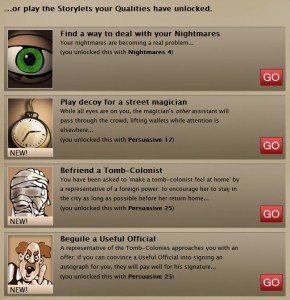So I’ve been playing the Web Game Echo Bazaar a lot lately and this sparked some thoughts about narrative design & story in MMO Web Games and common game design standards.
First off let’s talk about classic Role-Playing Games for a minute here. The key thing in many tabletop RPGs is the story; they’re all about telling a story together. They’re at their best, when the individual player has to take meaningful choices that shape the ongoing story. What makes these decisions so strong is that they are irreversible. Whatever you chose you have to live with, which will make you think more about how you play and act.
This is something that’s usually lost in video games. With the (expected) ability to save and load previous states of the game, a story decision loses much of it’s weight. You can decide one way, see the consequences, then load and chose the other options. This somewhat “cheapens” the decision because it makes it possible to evade the results of your actions. Games can somewhat work around that by delaying the consequences of an action. That way, by the time you hit the consequences you’re not as likely to go load a very old save game.
However the persistent and shared worlds of MMOs can help here. Actually it’s both a boon and a curse when it comes to narration. A boon since load/save features don’t really work with persistent worlds (and aren’t expected) MMOs have the potential to have meaningful narrative decisions. It’s not quite that easy though. The curse of the persistent world is that with so many players sharing a space it is difficult to create a story that feels unique and that can have any impact on the world, since it shouldn’t inconvenience the other players and their story.
 That’s where Web Games (and Echo Bazaar for that matter) come in though. Since these don’t represent a shared “physical” virtual space, the stories can feel a lot more intimate.
That’s where Web Games (and Echo Bazaar for that matter) come in though. Since these don’t represent a shared “physical” virtual space, the stories can feel a lot more intimate.
Echo Bazaar does quite a good job at this, presenting you with a wealth of narrative bits that you can choose to create what seems to be your own story. For example there are often options where you have multiple “tasks” leading up to one final decision.
Here the decision feels like it has much more narrative weight, since you can’t just go ahead and do it differently. Well at least that was what I thought when I first took one of these decisions. Unfortunately though this is greatly weakened by the fact that these composite tasks (multiple jobs leading to one decision) can be replayed for a while, allowing you to do the same thing over again.
So to put things in a nutshell: MMOs have the potential to present really meaningful narrative decisions to the player since decisions can be final.
Agree? Disagree? Debate!



